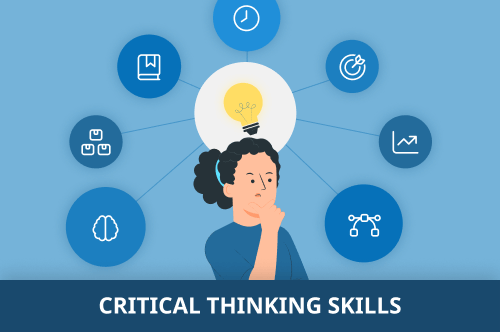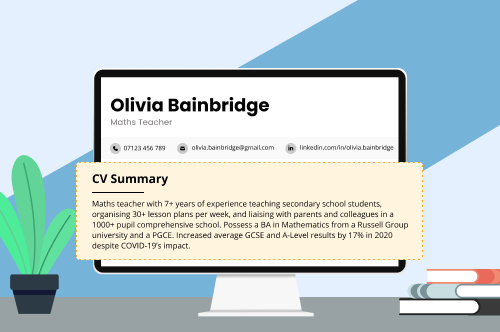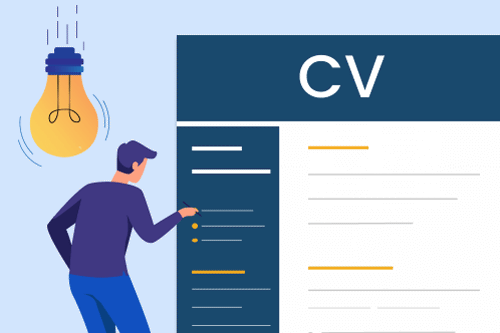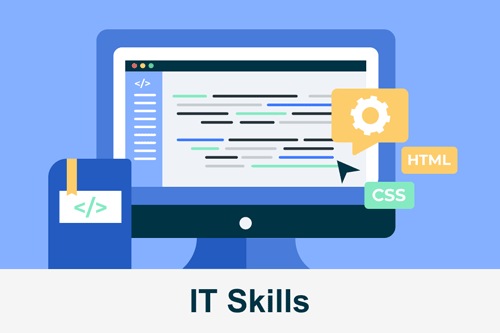What is critical thinking?
Critical thinking is a skill that helps you analyse facts carefully and objectively before coming to a conclusion.
These abilities require approaching ideas rationally at work, school, and in your everyday life.
Being a critical thinker also involves:
- carefully evaluating sources such as data and research before making a decision
- considering how accurate and reliable your information is
- being open to different views and opinions
- removing your judgements and biases when necessary
9+ key critical thinking skills for your CV
Not sure how to write a professional CV that includes critical thinking skills? These skills belong in the transferable abilities (or soft skills) category of your CV because these personality-related skills show how you’d communicate with your colleagues and handle challenging situations.
As you’re listing competencies on your CV, consider including your critical thinking soft skills if:
- your target role involves researching or analysing facts and figures (e.g., data, reports, graphs)
- the job requires identifying solutions or making decisions
- you’re applying for managerial or executive positions
- the company specifically asks for them in the job advert
Let’s discuss 9+ essential critical thinking skills to include on your CV:
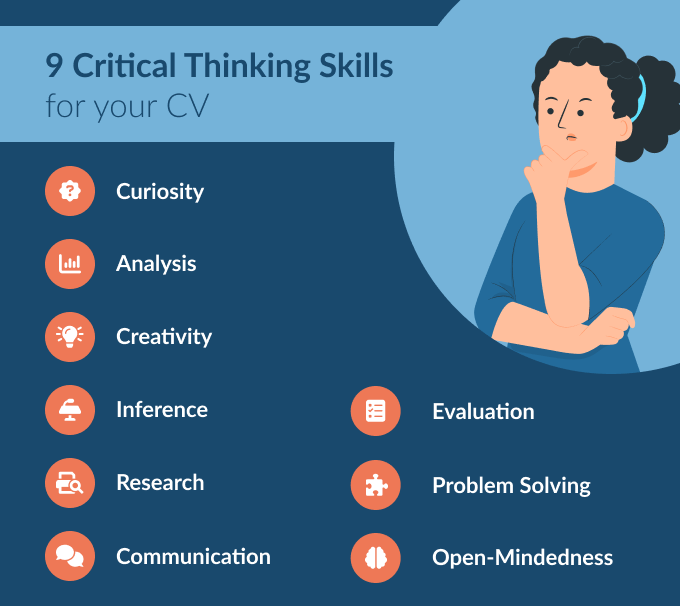
1. Curiosity
Employers like applicants who aren’t afraid to ask questions and pick up new concepts, so mention your curiosity to show employers you enjoy learning.
Highlight your desire to seek answers and actively participate at work by listing these traits:
- Active listening skills
- Attentiveness
- Empathy
- Optimism
- Taking initiative
2. Analysis
An important aspect of critical thinking is carefully examining different types of information before making a choice.
For instance, selecting the most relevant facts to use in a research paper shows you’re an analytical thinker.
Here are other abilities for your CV to show you can dive deeply into issues:
- Attention to detail
- Auditing
- Data and information analysis
- Quantifying results
- Strategic planning
3. Creativity
Coming up with new solutions and possibilities takes effort. Employers look for applicants who can think of innovative ways to help their company develop, so list your creativity skills.
Below are some creativity-related skills for your CV:
- Brainstorming
- Creative thinking
- Imagination
- Originality
- Product development
- Storytelling
4. Inference
Inference means making an educated guess when you have limited information.
So if you have industry-specific experience or technical knowledge, mention your ability to find likely explanations and draw conclusions based on evidence.
List these skills to show you’re good at making informed choices:
- Deductive reasoning
- Implication
- Interpretation
- Memory
- Reading skills
- Teaching skills
5. Research skills
Including research skills on your CV tells employers you’re comfortable with studying materials and gathering relevant resources to help you solve a problem.
Here are some examples:
- Data collection
- Planning and scheduling
- Interviewing and surveying
- Recognising patterns
- Report writing
6. Communication
Using effective communication to share your thought process is a valuable skill employers look for in their candidates.
For example, using simpler terms to explain a complex issue to your coworkers shows you’re thinking critically about your word choice.
List these communication-related abilities when writing your CV:
- Collaboration
- Confidence
- Explaining complex information in a simple, understandable way
- Oral and written communication skills
- Respect
- Presentation skills
- Providing feedback
7. Evaluation
Employers are more likely to consider you for a position if they think you’re capable of making helpful decisions. So include your ability to determine positive outcomes and minimise errors by listing your evaluation skills.
These are other skills to convey your good judgement:
- Growth mindset
- Management skills
- Observation
- Performance analysis
- Setting boundaries
8. Problem solving
No job is perfect, so not being scared to tackle difficult issues is a skill employers want to see in their candidates.
Demonstrating your proactivity at the workplace and eagerness to find solutions might even lead to future management positions.
Here are some other problem-solving skills you can mention:
- Conflict resolution
- Creating budgets
- Foresight
- Leadership skills
- Taking initiative
- Time management skills
9. Open-mindedness
Being willing to learn about other perspectives and different possibilities tells employers you’re easy to work with and a good cultural fit for their team.
List these skills to show you’re accepting of new ideas and suggestions:
- Adaptability
- Diversity
- Fairness
- Humility
- Objectivity
- Reflection
- Teamwork-related abilities
- Respect for others
- Self-improvement
- Willingness to accept feedback
- Tact
- Interpersonal abilities
Critical thinking examples for your CV
Besides listing your critical thinking skills in your CV skills section, try describing them throughout your work history section. Including direct examples of your critical thinking skills provides context for employers and gives them an idea of the positive impact you could bring to their company.
Pair action verbs such as ‘Identified’ or ‘Researched’ with hard numbers such as percentages, data, and time worked to highlight your key leadership skills and previous accomplishments.
One way to do this quickly is to quickly list out your previous responsibilities and achievements using a CV maker and then consider how you applied your critical thinking skills within these contexts.
For instance, this applicant describes their inference and problem solving abilities using bullet points in their work experience section:
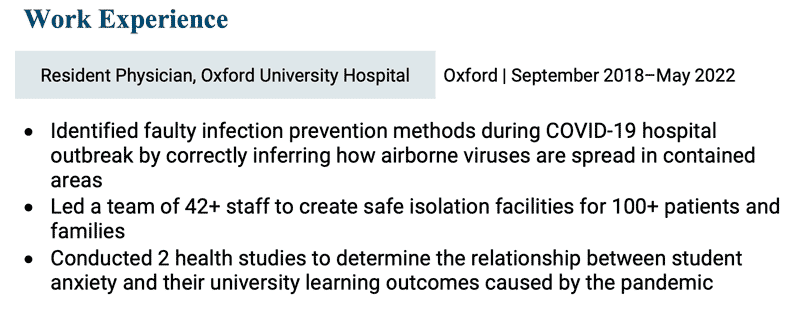
Additionally, highlight your critical thinking skills in your cover letter. The easiest way to do so is to use a cover letter builder that takes just minutes to write your content.
How to develop your critical thinking skills
Improving your critical thinking abilities requires time and effort. We discuss three ways to become a stronger critical thinker below:
1. Be aware of your biases
We’ve all got our personal judgements and biases based on our upbringings and personalities.
So try reflecting upon your own biases by:
- asking yourself open-ended questions before making a decision
- researching different sources of information
- assessing your strengths, weaknesses, and preferences and how they might impact your opinions
Learning to let go of personal biases and quick judgements helps you think more objectively and is a useful tool when working with new clients, colleagues, or peers who think differently from you.
2. Further your education
Our world is full of information, so take advantage of it by reading more books, articles, and research on topics related to your work or interests.
You can also try taking more online or in-person courses to hear expert opinions and further develop your knowledge.
3. Get to know people who are different from you
Be open to meeting people of all ages, personalities, and backgrounds.
Listening to another person’s ideas and opinions (even if you disagree with them) can help you better understand the issues you’re facing so you can learn more about a new topic.
Frequently asked questions about critical thinking skills
Here are some questions and answers to help you understand why being a critical thinker is a valuable trait to have:
- Why is critical thinking important?
- What are the four steps to critical thinking?
- How can I demonstrate my critical thinking skills to potential employers?
1. Why is critical thinking important?
Critical thinking is important because it helps you view situations in your daily and professional life with sharper eyes.
Using critical thinking skills regularly and taking time to reflect upon the information you receive helps you better understand yourself and the world around you.
Why critical thinking skills are important for daily situations
First, knowing how to think deeply about issues and consider other perspectives is helpful for solving everyday challenges. Thinking critically can help you determine whether you’re making appropriate choices and if you should consider other possibilities.
For instance, imagine you’re looking at a Facebook advert for a £50 hoover. Instead of buying it instantly because you need a new hoover, you might decide to do a Google search for more information.
Reviewing the advert’s website claims and appearance in addition to other competitor websites are all signs of critical thinking.
And after considering your budget and researching general hoover prices in the UK, you now have a clearer idea of whether you think the company is credible and if their hoover is a suitable product for you.
Why critical thinking skills are important in the workplace
Next, critical thinking skills are important in professional settings because employers want to know you can:
- solve complex challenges independently or in a team
- share your opinion and provide feedback using evidence or logic
- think of innovative ways to raise standards and improve efficiency at your workplace
Employers find critical skills valuable in a work environment because they prove you’re capable of handling your tasks, making smart judgements, and possibly moving up as a future leader in the company.
Critical thinking skills are essential for many industries and experience levels. And if you know how to produce a CV that clearly provides evidence of your critical thinking skills, employers are more likely to consider you for the role and then ring you for an interview.
2. What are the four steps to critical thinking?
Want some actionable ways to help you become a critical thinker?
These are four steps outlining how you can use your critical thinking abilities when approaching a problem or a question:
3. How can I demonstrate my critical thinking skills to potential employers?
There are several ways to showcase your critical thinking skills to target employers if you’re answering questions at an interview or on your job application:
- provide specific examples from previous work experiences where you used critical thinking to solve problems or make decisions
- discuss your approach to a difficult problem or situation by listing the steps you’d take to find a solution
- describe how you evaluate and assess information to make informed decisions
- discuss any training or education you’ve received that helped you develop your critical thinking skills
